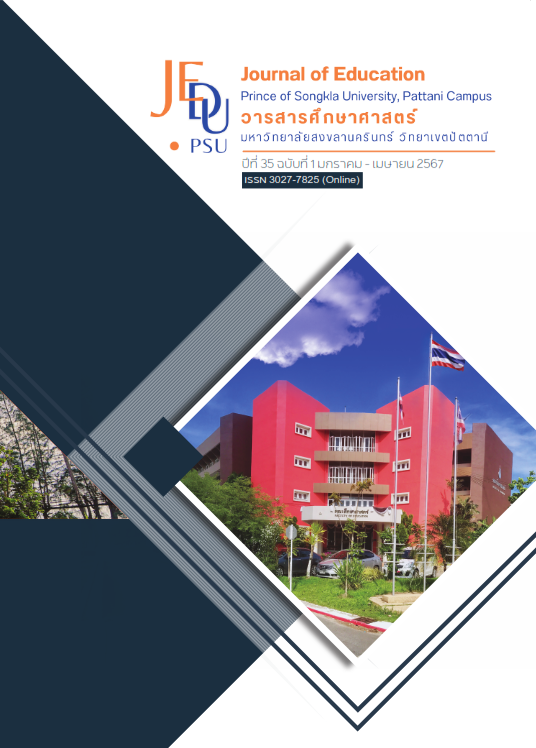อภิปัญญาเพื่อการเรียนรู้และการสอนภาษาไทย
Main Article Content
บทคัดย่อ
และการจัดการตนเองในกระบวนการเรียนรู้เชิงรุก ซึ่งช่วยพัฒนาความสามารถในการคิดอย่างมีวิจารณญาณและทักษะการสื่อสารอย่างสร้างสรรค์ มิติที่สองคือการใช้กลยุทธ์การสอนของครู เพื่อพัฒนาผู้เรียนให้มีความรู้ ประสบการณ์และกลยุทธ์การเรียนรู้เชิงลึก ส่งเสริมการเรียนรู้แบบนำตนเองได้อย่างอิสระและต่อเนื่อง พร้อมปรับเพิ่มบทบาทของการประเมินการเรียนรู้ที่หลากหลาย โดยเฉพาะการประเมินการเรียนรู้ขณะเรียนรู้ แนวทางการนำอภิปัญญาไปใช้ในการจัดการเรียนรู้ สามารถช่วยครูภาษาไทยสร้างการเปลี่ยนแปลงในระดับชั้นเรียนได้ ด้วยกรอบคิดแบบพัฒนา และการปฏิบัติบนฐานความรู้ที่ชัดแจ้งว่าอภิปัญญาคืออะไรทำไมต้องใช้และใช้อย่างไร
Article Details

อนุญาตภายใต้เงื่อนไข Creative Commons Attribution-NonCommercial 4.0 International License.
เอกสารอ้างอิง
Anderson, N. J. (2012). Metacognition: Awareness of Language Learning. In Mercer, S., Ryan, S., Williams, M. (eds), Psychology for Language Learning. London: Palgrave Macmillan.
Anderson, L. W. & Krathwohl, D. R. (2001). A Taxonomy for Learning, Teaching and Assessing: A Revision of Bloom’s Taxonomy of Educational Objectives: Complete Edition. Longman.
Angela, L. (2020). Metacognition and Its Contribution to Student Learning Introduction. College Student Journal, 54(1), 1-7.
Aşık, G. & Erktin, E. (2019). Metacognitive Experiences: Mediating the Relationship between Metacognitive Knowledge and Problem Solving. Education and Science, 44(197), 85-103. DOI:10.15390/EB.2019.7199.
Bellanca, J. A., Fogarty, R. J. & Pete, B. M. (2019). Seven Key Student Proficiencies for college and career readiness. Solution Tree.
Cambridge University. (2022). The Cambridge Life Competencies Framework Introduction. Cambridge University Press.
Cromley, J. G. & Kunze, A. (2020). Metacognition in education: Translational research. Translational Issues in Psychological Science, 6(1), 15-20. https://doi.org/10.1037/tps0000218
Dejamonchai, S. & Darnsawasdi, C. (2017). The Use of Learning Activities to Promote French Beginning Learners’ Metacognition. Journal of Humanities Naresuan University, 14(3), 1-14. [in Thai]
Flavell, J. H. (1979). Metacognition and cognitive monitoring: A new area of cognitive–developmental inquiry. American Psychologist, 34(10), 906-911. https://doi.org/10.1037/0003-066X.34.10.906
Frey, N., Fisher, D. & Hattie, J. (2016). Surface, Deep, and Transfer? Considering the Role of Content Literacy Instructional Strategies. The Journal of Adolescent & Adult Literacy, 60(5), 567-575. https://doi.org/10.1002/jaal.576
Haukås A., Bjørke, C. & Dypedah, M. (2018). Metacognition in Language Learning and Teaching. Routledge.
Herron, S. (2022). Metacognition and Language Learning on an International Foundationm Programme. Individual and Contextual Factors in the English Language Classroom, 24, 277-301.
Irvine, J. (2017). A Comparison of Revised Bloom and Marzano's New Taxonomy of Learning. Research in Higher Education Journal, 33.
Marantika, J. E. R. (2021). Metacognitive ability and autonomous learning strategy in improving learning outcomes. Journal of Education and Learning (EduLearn), 15(1), 88-96.
Marzano, R. J. & Kendall, J. S. (2007). The new taxonomy of educational objectives. Corwin Press.
Mitsea, E. & Drigas, A. (2019). A Journey into the Metacognitive Learning Strategies. International Journal of Online and Biomedical Engineering, 15(14), 4-19. DOI: https://doi.org/10.3991/ijoe.v15i14.11379
Muijs, D. & Bokhove, C. (2020). Metacognition and Self-Regulation: Evidence Review. London: Education Endowment Foundation.
Nasongkhla, J. (2018). Digital learning design. Bangkok: Chulalongkorn University. [in Thai]
Norman, E., Pfuhl, G., Sæle, R.G., Svartdal,F., Låg T., Dahl, T.I. (2019). Metacognition in Psychology. Review of General Psychology, 23(4), 403–424. https://doi.org/10.1177/1089268019883
Office of the Education Council. (2021). Guidelines for the development of core competencies of fundamental education learners in transition to competency-based curriculum. Bangkok: Prikwan Graphics Ltd. [in Thai]
Ohtani, K. & Hisasaka, T. (2018). Beyond intelligence: ameta-analytic review of the relationship among metacognition, intelligence, and academic performance. Metacognition and Learning, 13, 179–212.
Ozturk, N. (2022). A Pedagogy of Metacognition for Reading Classrooms. International Journal of Education and Literacy Studies, 10(1), 162-172.
O’Hara, S., Pritchard, R. & Pitta, D. (2019). Teaching with and for Metacognition in Disciplinary Discussions. In Feza, N. (ed), Metacognition in Learning. IntechOpen. DOI: 10.5772/intechopen. 86665
Perry, J., Lundie, D., & Golder, G. (2018). Metacognition in schools: what does the literature suggest about the effectiveness of teaching metacognition in schools?. Educational Review, 71(4), 483-500. https://doi.org/10.1080/00131911.2018.1441127
Pornkul, C. (2014). Teaching Thinking processes Theory and Implementation. Bangkok:Chulalongkorn University. [in Thai]
Quigley, A., Muijs, D., & Stringer, E. (2018). Metacognition and Self-Regulation Learning Guidance Report. Education Endowment Foundation.
Rangubtuk, W. (2020). Thai Learners’ Key Competencies in a VUCA World. Journal of Teacher Professional Development. 1(1), 8-18. [in Thai]
Rhodes, M.G. (2019). Metacognition. Teaching of Psychology, 46(2), 168-175. https://doi.org/10.1177/0098628319834381
Shea, N. (2019). Concept-metacognition. Mind Language, 35(5), 565-582. https://doi.org/10.1111/mila.12235
Stanton, J. D., Sebesta, A. J. & Dunlosky, J. (2021). Fostering metacognition to support student learning and performance. Life Sciences Education, 20(3), 1-7.
Surang, K. (2022). Educational Psychology. Bangkok: Chulalongkorn University. [in Thai]
The Education State. (2017). High impact teaching strategies Excellence in Teaching and Learning. Melbourne: Department of Education and Training Melbourne.
Thongart, C. (2018). Thai Language Learning Management Using 21st Century Competencies-based. Journal of Education Studies. 46(1), 171-184. [in Thai]
Vries, J. A., Dimosthenous, A., Schildkamp, K., & Visscher, A. J. (2023). The impact of an assessment for learning teacher professional development program on students’ metacognition. School Effectiveness and School Improvement, 34(1), 109-129.
Wangkaewhiran, T. (2019). Instructional Model Based on Reflective Metacognition Strategies with Research Based Learning: A Learning Management Innovation for Develop 21st Skills. Journal of Education Thaksin University. 19(2), 1-16. [in Thai]
Wiboolyasarin, W. (2018). Methodology of Thai Language Learning Management. Bangkok: Chulalongkorn University. [in Thai]
Wilson, D. & Conyers, M. (2016). Teaching Students to Drive Their Brains: Metacognitive Strategies, Activities, and Lesson Ideas. ASCD.
Zhang, D. & Zhang, L.J. (2018). Metacognition and Self-Regulated Learning (SRL). In Second/Foreign Language Teaching. Springer International Handbooks of Education.
Zyl, S.V. & Mentz, E. (2022). Deeper Self-Directed Learning for the 21st Century and Beyond. In Self-Directed Learning and the Academic Evolution from Pedagogy to Andragogy. IGI Global. DOI:10.4018/978-1-7998-7661-8.ch004


